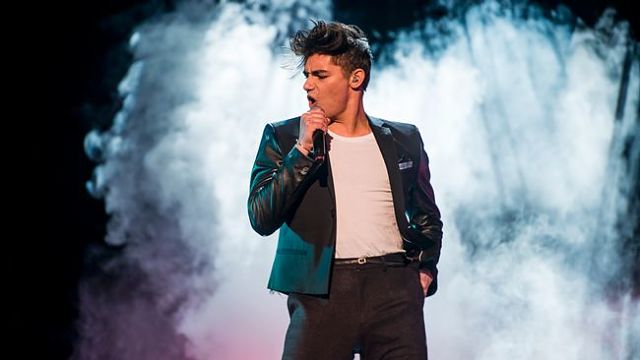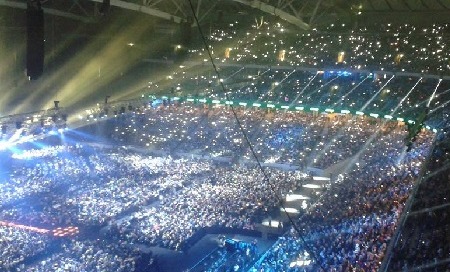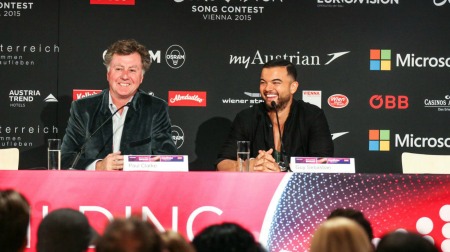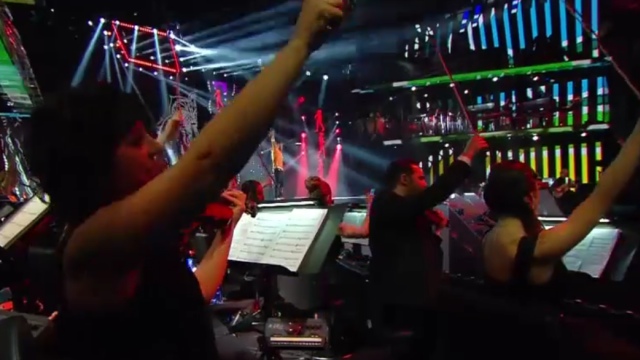The Eurovision Song Contest’s community regularly praises SVT’s Melodifestivalen as the barometer of all National Finals. Its mere name holds a hallowed place for many because of its sheer scale, its ability to produce more hits than misses at the Song Contest and it transforms all of its artists into household names both in Sweden and across Europe.
It is often cited as the one National Final that our own national broadcasters should emulate… whilst in the next breath criticising it when it fails to give Eurovision fans what they demand.
As international viewers of Melodifestivalen, indeed of all the National Finals that lead up to the Song Contest, I believe we are missing the point.

Anton Ewald once more on the Melodifestivalen stage (Photo: Olle Kirchmeier, SVT)
M. E. L. F. E. S. T.
Many of us tend to forget that the primary reason of Melodifestivalen – or indeed the likes of Sanremo, Festival I’Kenges and Eesti Laul – is about the opportunity for artists to gain exposure in what is one of the most watched programs of the year in each nation.
These shows are not provided to pander to a livestream audience of a few tens of thousands. They exist at a national level, to showcase local talent to a local audience. The successful national final formats are not built around being selected for the Eurovision Song Contest; rather they are about capturing ratings for the broadcaster; the ability to build on production techniques; and create development opportunities and increase sales for the artists. Picking up a ticket to represent the nation at the Song Contest is unlikely to be near the top of the outcome list.
As Aftonbladet’s Tobbe Ek explained on a recent Insight Podcast’s ‘Eurovision Thought’, Melodifestivalen is a success not just because SVT spends money on making a big show. It is a success because it is a nurturing home for artists, it offers something unique to music publishers, and it supports the mainstream media by providing long running celebrity story lines that promote high levels of engagement online, in print, and in broadcast.
Melodifestivalen 2019 saw John Lundvik lift the trophy. That follows on from his debut at Melodifestivalen 2018, arguably an apprenticeship year where the pressure was not necessarily to win, but to get to grips with the circus, to become comfortable as a TV singer and the associated social media intrusions, and build up a specific set of skills.
The vast majority of the Swedish music industry will not release songs from any major act during the first calendar quarter unless its a Melodifestivalen track. That’s the relationship the Swedish show has over the industry. For a quarter of the year, it is the industry.
And don’t forget that the media knows this as well. There is a virtuous circle of music being released, artist promotion, stories in the media, more sales and awareness, more promotion, and so on. The show has a mutually beneficial relationship with the media.
‘Do it like Melodifiestivalen‘ is the demand of many fans, but the simple fact is that being a big TV show is not the reason that Melodifestivalen is a success, or why Sweden is on a hot streak at the Song Contest. Melodifestivalen respects the acts, provides a training ground, offers a unique outlet for record labels and has the respect of the media and the public.
You don’t replicate that just by moving your National Selection into a slightly bigger venue with a bit more money.

The view from the back of Friends Arena during the 2014 Melodifestivalen Final
Compare And Contrast Two New Formats
Let’s wind the clock back to earlier in the 2019 National Final season to examine the approach of two selection shows. One which was just about selecting a song for Eurovision, and another that was looking towards building a national platform for music alongside the Tel Aviv decision.
The United Kingdom’s ‘Eurovision: You Decide’
Although it kept the moniker of ‘You Decide’ for a fourth year, 2019 saw the BBC scale down its production from a theatre setting to a television studio, as well as introducing a new tactic of having six acts performing three songs.
The songs came first, and were the result of a songwriters camp alongside an open call for submissions. The singers – all alumni of previous TV talent shows – were only approached following the three songs being chosen. A three-person jury was responsible for choosing which was the best performance of each song, before opening it up to the public to make the final choice between three acts.
The inclusion of celebrity juries to act as talking heads means that the focus is lost on both the song and artist. Rather than celebrate the music through the show and then choose a victor, we are forced to listen to others opinions and judge constantly in the same way as we witness many other talent shows.
Count the number of acts who are eager to appear competitively in multiple editions of Melodifestivalen, even though they lost, and compare that to the count of returning acts at You Decide.
You Decide as a model delivered a song and performer to represent the United Kingdom, but the feeling of the show being part of a larger musical and media narrative is not present. The songs were not officially released in their own right for streaming on the major services such as Spotify until early March. With limited promotion on television and radio, there was no ability for the artists to use ‘You Decide’ as a platform to build their career and visibility while they were in the spotlight.
SuRie described her business relationship with the BBC bluntly in an interview with Vice magazine during her time as the UK act for Lisbon 2018:
Back in London, I [Journalist Michael Segalov] brought up the financials of representing Great Britain with SuRie, having assumed there would be a substantial contract and pay package given the workload she has to take on. “I get a one-off fee for the show itself, but that’s it,” she’d told me bluntly. “I just need to survive. If I had a waitressing job they’d have said, ‘Keep your shifts and we’ll work around it.’“
These issues are ultimately compounded with the years of the Song Contest being seen as something to be ridiculed. One simple example is the stark difference in how Graham Norton approaches the musicians on both his TV and radio shows compared to how musicians are discussed in his Eurovision commentary. You can still have fun and present Eurovision as light entertainment while offering the performers on the Eurovision stage the same artistic respect as Norton’s sofa.
How the Eurovision Song Contest is spoken about by the BBC is intrinsically linked to the way the public, artists and those internally employed perceive its value. Whilst this current presentational style and lack of investment in the artists continues, the ability of attracting any known serious talents will be left wanting. Without a valid and quantifiable outcome, be it for future career or financial opportunity, it shall continue to be ignored by artists of the calibre seen in other national selection shows.
SBS’s ‘Eurovision: Australia Decides’
‘Eurovision: Australia Decides’, whilst admittedly also existing as a single show to select an entry for the Eurovision Song Contest, has a vision goes beyond the remit of finding a Eurovision song. Its rhetoric and approach to artists and the public differs greatly from the approach seen at the BBC.
Australia shares much of its Eurovision history with the United Kingdom, having taken the commentary of previous BBC commentator Terry Wogan for twenty-five years. When this was changed in 2009, the broadcaster began the journey of changing local perceptions by employing its own commentary team. Whilst it continued to view Eurovision with a side eye and humour, gone was the element of ridicule.
Once Australia achieved participant status in 2015, the frames of reference and style again stepped up to become more serious in nature.

Guy Sebastian at Eurovision 2015 (Photo: Eurovision.tv)
Australian Head of Delegation and Production since 2009 – Paul Clarke, was instrumental in the change of perception about the Song Contest, and now has the first ‘Australia Decides’ under his belt. He openly acknowledged that the selection show took its cues from Sweden, but rather than jumping to bring on Swedish scriptwriters and hosts, it instead reached out to Mr Melfest himself, Christer Bjorkman as a consultant and then juror in the process.
The production chose to utilise the same voting methodology as the Song Contest, with 50 percent jury score and 50 percent televoting that emulated the Contest as much as possible, offering viewers something that they instantly recognised and associated with the Eurovision format.
Why Did Australian Acts Take A Chance?
What of the performers? Why were so many artists of status willing to risk their reputations at an unknown National Final? As it stands, Australia is entirely lacking in live music performance outlets on television and radio. Great music performance shows like Countdown in the 1970s & 1980s, and Recovery in the 1990s (which was produced by Paul Clarke) have long disappeared from local television.
The Australian music industry therefore is hungry for an new outlet, and the possible benefits gained stand to outweigh any reputational damage. Despite Jessica Mauboys poor showing at Lisbon 2018, her career within Australia continues to flourish. Armed with the knowledge that a poor Eurovision result is not career-ending, coupled with a selection show in the trusted hands of long-time TV professional, the music industry regards the rewards as outweighing any risk.
The faith of the untested format locally was well highlighted in a post from George Sheppard, lead singer of competing band Sheppard prior to the jury final:
If you’re a new artist trying to make a name for yourself in Australia, you realistically have one of two options – Triple J [the Government funded alternative radio station], or commercial radio. Triple J doesn’t often go for pop music and commercial radio doesn’t often touch unknown artists. This means we have a pretty big void in the market that leaves very little opportunity for upcoming pop artists to flourish in Australia.
[‘Eurovision – Australia Decides’] essentially gives us a rare outlet to celebrate pop music, in a country where it’s not widely accepted or celebrated… it gives us all a brand new avenue to celebrate this kind of music. It gives up and coming writers and performers a new opportunity to showcase their original songs, and it give us a way to start building a whole new lane of Australian music culture for the next generation of artists coming through who don’t want to go on a reality TV show, or sign away everything to a major label.
Clearly, the approach and reasons given for Australia Decides to be held resonated with several artists, reaching well beyond the promise of Eurovision fame. When the team from SBS made a national call out for submissions last October, it resulted in 700 submissions in a period of just 3 weeks. The inaugural show gathered ten diverse contestants ranging from the above chart-topping darlings Sheppard to newly discovered talent like Leea Nanos. Recognised artists in the genre ranges of EDM, opera, rock and RnB were keen to get involved, which also added to its appeal and opportunity to build reputation in public.
Australia Decides reached 813,000 people, resulting in approximately 70% increase on usual Saturday night reach for the channel, and also was the tenth most watched program across Australia on the day.
The selection show trended globally on Twitter throughout the Saturday evening and held seven out of ten of the top trending hashtags in Australia. For the artists themselves, following the show, Sheppard, Kate Miller-Heidke and Electric Fields all held a top 20 positions in downloads, with Leea Nanos, Courtney Act, Alfie Arcuri also featuring in the top 100.
This measurable success should ensure that the format returns next year, and likely to remain in place for the five years of the negotiated invitation Australia now has to the Eurovision Song Contest.
Ignore Sanremo At Your Peril
It’s understandable that Melodifestivalen is the show that the Eurovision fans turn to when looking at National Finals, but I want to point out that there is one other show that delivers the three key elements highlighted – namely artistic support, music industry support, and mainstream media support. And that’s Italy’s Sanremo.

The RAI Orchestra at Sanremo
Every year Eurovision fans turn on to the final night of Sanremo and get lost. They don’t see a replication of the Song Contest format as a National Final. It’s long and bloated, packed with guest singers in awkward places, the occasional interview with Italy’s oldest midwife, and comedy sketches occasionally lifted from old Morecambe and Wise sketches. But it shares the same mythical power as Melodifestivalen.
Sanremo is an Italian institution, and you see the same building blocks. You have a show that artists want to appear in, and are happy to keep returning to throughout their careers. You have a huge audience watching on television, with over fifty percent market share for each show. You have the music industry working to get their acts either in competition, or invited as guest singers. And you have the Italian press eager for any piece of news about the acts appearing, the songs, and the drama. Oh and all the other television channels know that there’s no point trying to compete, so they throw up a mix of classic films, repeats, or their own coverage of the festival.
Sanremo has the respect of the music industry. It delivers a show that the Italian public is comfortable with. And its media coverage pushes other stories well down the editorial schedule. That’s why it continues to work.
Choose A Three Minute Song Or A Strategy For The Ages
What we can see is that the shows that have endured most and achieved great success are those that have taken a step away from the reality TV mould, that look beyond fads and instead employ best practice techniques, that choose to focus on the artist and song, and prioritise the celebration of the local music scene in all its forms. On it’s first outing it seems Australia has done so, and thus there is no reason why others cannot follow suit. A country that already has plenty of opportunities where pop is celebrated, artist development is encouraged and seemingly boundless amount of talent to draw upon, such as the United Kingdom, needs to create a new outlet that will be respected in the industry.
Even Eurovision as a contest focuses on something more than just crowning its winner – it trusts in its foundation of utilising music as a way of bringing Europe closer together, the testing of new technologies in broadcast and providing artists a platform for exposure to a greater audience.
So as a final thought, I believe that instead of seeing Melodifestivalen as the ‘selection’ show to mimic, one should look beyond the size of the show and instead learn from how a national selection can benefit the artists and the artistic fabric of a country, and can stand alone as a key annual televisied event.
The concept of a successful National Final should be more than ‘we need three minutes for May’. The best options are where the goals include, but are not limited to, the Eurovision Song Contest. It’s bigger than us.










Thank you for this article. I have watched the full week of San Remo two years in a row now, and I’m in love with it. Even though I don’t speak Italian, what comes across to me is a celebration of culture, a respect for singers of all ages, and a love of music.
Great article, Sharleen. Keep ‘em coming!
Thank you… Wonderful insight!
Hear hear!